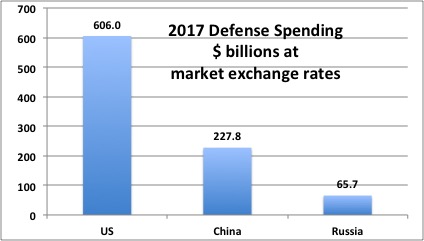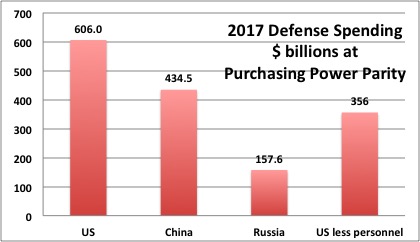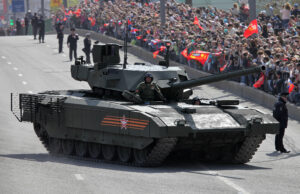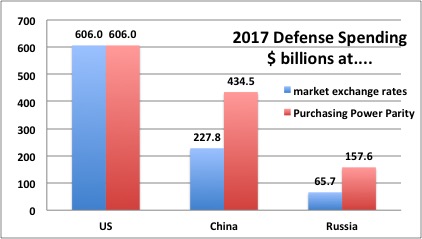ΣΧΟΛΙΟ ΙΣΤΟΛΟΓΙΟΥ: Κατά την διάρκεια του ψυχρού πολέμου οι Η.Π.Α αντιμετώπισαν την ΕΣΣΔ και τους δορυφόρους της buncha sucky.Τώρα θα αντιμετωπίσουν μια πολύ πιο ΙΚΑΝΗ Ρωσία , εναρμονισμένη και σε ΣΥΜΜΑΧΙΑ με μια ισχυρή Κίνα...καθώς και ένα σωρό δορυφόρους τους για τους οποίους δεν γνωρίζει ακόμα κάποια πράγματα. Η ισορροπία της εξουσίας μετατοπίστηκε τόσο δραστικά...που θα το δούμε όταν θα έρθει η ώρα της σύγκρουσης.
Στη δεκαετία του '50 οι ΗΠΑ θα μπορούσαν να έχουν κερδίσει.Στην δεκαετία 60s και 70s είχε μια πιθανότητα πάλης και ισοπαλίας .Στα τέλη της δεκαετίας του 80 η τρέλα έγινε κάπως πραγματικότητα..αλλά οι Η.Π.Α θα μπορούσαν να έχουν επιβιώσει στην μεταξύ τους σύγκρουση....τώρα ΔΕΝ ΕΧΟΥΝ ΚΑΜΜΙΑ ΠΙΘΑΝΟΤΗΤΑ ΝΑ ΚΕΡΔΙΣΟΥΝ....ΑΝ ΑΝΤΙΜΕΤΩΠΙΣΟΥΝ ΚΙΝΑ ΚΑΙ ΡΩΣΙΑ ΜΑΖΙ.
We aren’t econometricians here at Breaking Defense, so our methodology is admittedly very rough. What we are good at is listening to Pentagon and Hill leaders very carefully, and I was struck by an exchange last week at a hearing of the Senate appropriations subcommittee on defense.

“I’m going to ask you all a town hall question; it’s the kind of thing you might run into in any town in America,” said Sen. Dick Durbin, the subcommittee’s ranking Democrat. “You tell us that one of our biggest threats, greatest enemies, is Russia;
turns out we read recently that Russia spends about $80 billion a year
on its military…..So let me get this straight: We’re spending $600, $700
billion against an enemy that’s spending $80 billion. Why is this even a
contest?”
The traditional answer is that the US has global commitments —
multiple allies to defend, myriad adversaries to deter — and therefore
it’s not fair to compare our budget to any one country’s. But General
Milley instead took issue with the math:
“I’ve seen comparative numbers of US defense budget versus China, US
defense budget versus Russia or any other number of countries,” Milley
said. “What is not often commented on is the cost of labor.”

“We’re the best paid military in the world by a long shot,” he
continued. “The cost of Russian soldiers or Chinese soldiers is a tiny
fraction. So we would have to normalize the data in order to compare
apples to apples and oranges to oranges…. take out the MILPERS (military
personnel) accounts for both the Chinese, Russians, and/or the US, and
then compare the investment costs.”
“I think you’ll find that Chinese and Russian investments, modernization, new weapons systems, etc., their R&D — which is all government-owned and also is much cheaper — I think you’d find a much closer comparison, Senator,” Milley concluded.
Now, estimating what China and Russia actually spend on defense is complex enough, let alone separating out their pay and benefits costs. Russian military pensions, for example, were paid from the defense budget until the mid-1990s, then taken out. So we can’t do the entire exercise Milley recommends. But we can do two crucial parts of it.

First, the standard comparisons of international defense spending —
like the graph above — convert everything to US dollars at market rates.
That’s fine if you’re comparing countries’ power to buy military
equipment with hard currency on the global market.
But countries like Russia and China buy most of their equipment from domestic suppliers, which they can pay in local currency. As Milley points out, most of these domestic defense firms are also either officially government-owned or heavily government-influenced, and their products are generally much cheaper than their US equivalents.
So instead of using market rates, a better measure (albeit still imperfect) would be Purchasing Power Parity (PPP), which tries to account for prices being different in different countries. That gets you this chart:
Now for the second part of Milley’s proposed comparison: Set aside the roughly 42 percent of the US defense budget that goes to pay and benefits. We can’t set aside the comparable portions of the Russian and Chinese budgets, because we don’t have good estimates of what they spend on personnel, but since personnel is a relatively small share of their budgets, we can still make a decent first approximation:

Now the US doesn’t look so dominant anymore. In fact, the Chinese
budget looks bigger: The unanswered question is how much of that we
should take away to account for their personnel costs.

Whatever methodology you use, Russian spending remains a fraction of
US — although that fraction rises sharply, from just 11 percent at
market exchange rates, to 26 percent at purchasing power parity, to 44
percent of US spending excluding pay and benefits. But Chinese spending
rises from 38 percent of US (market rates) to 71 percent (PPP) to 122 percent (excluding US pay & benefits spending).
Now, this is comparing the entire Chinese budget to part of the US budget, so the actual China:US ratio is lower that this graph shows. How much lower depends on how much of the Chinese budget goes for personnel. But if it’s anything less than 18 percent of their budget, about $78.5 billion — the difference between their total budget (PPP adjusted) and ours less personnel — then they’re still spending more than we are, adjusted for purchasing power, on weapons, training, operations, and so on.

The obvious counterargument is that you generally get what you pay
for. US military leaders routinely extoll the quality of American
personnel — their skill, dedication, and initiative — as our decisive
advantage, more important than even our advanced technology. So perhaps
our high spending on personnel is central to our military performance.
But perhaps regimes that treat their people less generously can still
get the human performance they need and have a lot more left over for new weapons.
ΠΗΓΗ
Στη δεκαετία του '50 οι ΗΠΑ θα μπορούσαν να έχουν κερδίσει.Στην δεκαετία 60s και 70s είχε μια πιθανότητα πάλης και ισοπαλίας .Στα τέλη της δεκαετίας του 80 η τρέλα έγινε κάπως πραγματικότητα..αλλά οι Η.Π.Α θα μπορούσαν να έχουν επιβιώσει στην μεταξύ τους σύγκρουση....τώρα ΔΕΝ ΕΧΟΥΝ ΚΑΜΜΙΑ ΠΙΘΑΝΟΤΗΤΑ ΝΑ ΚΕΡΔΙΣΟΥΝ....ΑΝ ΑΝΤΙΜΕΤΩΠΙΣΟΥΝ ΚΙΝΑ ΚΑΙ ΡΩΣΙΑ ΜΑΖΙ.
"I've seen comparative numbers of US defense budget versus China, US defense budget versus Russia," Gen. Milley said. "What is not often commented on is the cost of labor. We’re the best paid military in the world by a long shot. The cost of Russian soldiers or Chinese soldiers is a tiny fraction."
WASHINGTON: It’s become a commonplace to say the US spends much more on defense than any other country — but what if that’s not exactly true? Inspired by something Army Chief of Staff Mark Milley said to the Senate, I pulled together some numbers that suggest America’s superior spending power erodes dramatically when you compare actual purchasing power. Once you factor in how much the US military spends on pay and benefits for uniformed and civilian personnel — almost half the budget by some measures — as opposed to weapons, operations, and training, then China’s defense budget may actually be bigger.
We aren’t econometricians here at Breaking Defense, so our methodology is admittedly very rough. What we are good at is listening to Pentagon and Hill leaders very carefully, and I was struck by an exchange last week at a hearing of the Senate appropriations subcommittee on defense.

Sen. Dick Durbin

Gen. Mark Milley
“I think you’ll find that Chinese and Russian investments, modernization, new weapons systems, etc., their R&D — which is all government-owned and also is much cheaper — I think you’d find a much closer comparison, Senator,” Milley concluded.
Now, estimating what China and Russia actually spend on defense is complex enough, let alone separating out their pay and benefits costs. Russian military pensions, for example, were paid from the defense budget until the mid-1990s, then taken out. So we can’t do the entire exercise Milley recommends. But we can do two crucial parts of it.

SOURCE: DoD 2019 budget submission, SIPRI database
But countries like Russia and China buy most of their equipment from domestic suppliers, which they can pay in local currency. As Milley points out, most of these domestic defense firms are also either officially government-owned or heavily government-influenced, and their products are generally much cheaper than their US equivalents.
So instead of using market rates, a better measure (albeit still imperfect) would be Purchasing Power Parity (PPP), which tries to account for prices being different in different countries. That gets you this chart:
Now for the second part of Milley’s proposed comparison: Set aside the roughly 42 percent of the US defense budget that goes to pay and benefits. We can’t set aside the comparable portions of the Russian and Chinese budgets, because we don’t have good estimates of what they spend on personnel, but since personnel is a relatively small share of their budgets, we can still make a decent first approximation:

SOURCE: DoD 2019 budget submission, SIPRI database

Russia’s domestically produced T-14 Armata tank on parade in Moscow.
Now, this is comparing the entire Chinese budget to part of the US budget, so the actual China:US ratio is lower that this graph shows. How much lower depends on how much of the Chinese budget goes for personnel. But if it’s anything less than 18 percent of their budget, about $78.5 billion — the difference between their total budget (PPP adjusted) and ours less personnel — then they’re still spending more than we are, adjusted for purchasing power, on weapons, training, operations, and so on.

Chinese J-20 fighter prototype, domestically produced (albeit possibly with stolen US data)
ΠΗΓΗ

4 σχόλια:
Αγαπητέ Αετέ,
χάνεις το χρόνο σου με τον Σπυρόπουλο. Ο άνθρωπος είναι καμμένος. Γι αυτόν μόνο οι Αχαιοί είναι πραγματικοί Έλληνες. Πέρισυ, να'ξερες πόσα ποστ και φωτο από ξενα και ελληνικά μουσεία τού τριψαμε στη μούρη εγώ και ο Μπουγας..Και Στο τέλος μας είπε υβριστές. Φωτο που είχαν το δεκαεξακτινο σε ασπίδες της Αθηνάς και του Απόλλωνα. Ο Σπύρος επέλεξε τη δική του πραγματικότητα. Σήμερα σκαρφίστηκε κάτι άλλο απαντώντας σε κάποιο σχολιαστή. Ότι αυτά τα αγγεία που τα δείχνουν αυτά, ήταν παραγγελίες από κάποιους τότε και μετέπειτα σφετεριστές και διαστρεβλωτες της αλήθειας.
Κάψιμο σου λέω...
Χαχαχαχα
Κοίτα σύμπτωση!
Μόλις τώρα είδα ότι καποιος ονόματι 'Φαινομενα' πήγε και βρήκε μια από αυτές τις αναρτήσεις που σου έλεγα στο προηγούμενο σχόλιο.
Σήμερα σχολιάζω από σμαρτ.
ΣΥΓΝΩΜΗ αν εμφανιστούν λάθη.
Aγαπητέ Κώστα....έχεις δίκιο δεν διαφωνώ, αλλά κάποια στιγμή όλοι αυτοί πρέπει να μπαίνουν στην θέση τους.Επειδή βρίσκουν και τα κάνουν...για αυτό πέρνουν αέρα.
Βρήκε όμως τις μέρες που έχω εγώ τι ζοχάδες μου για το θέμα της Μακεδονίας....και τον "στόλισα" όπως του άξιζε.
Όντως είναι καμμένος, και έχει χοντρό πρόβλημα.Αλλά δεν του φταίμε εμείς για αυτό.
Εσύ και ο Μπουγάς είστε καλά παιδιά...και του μιλήσατε όμορφα και ευγενικά....εγώ δεν έχω την δική σας υπομονή.
Μου φαίνεται θα σχολιάζω μόνο στο δικό σου μπλόγκ....όπου τα σχόλια είναι ελεγχόμενα, και δεν γράφουν τέτοιοι τύποι.
Δημοσίευση σχολίου